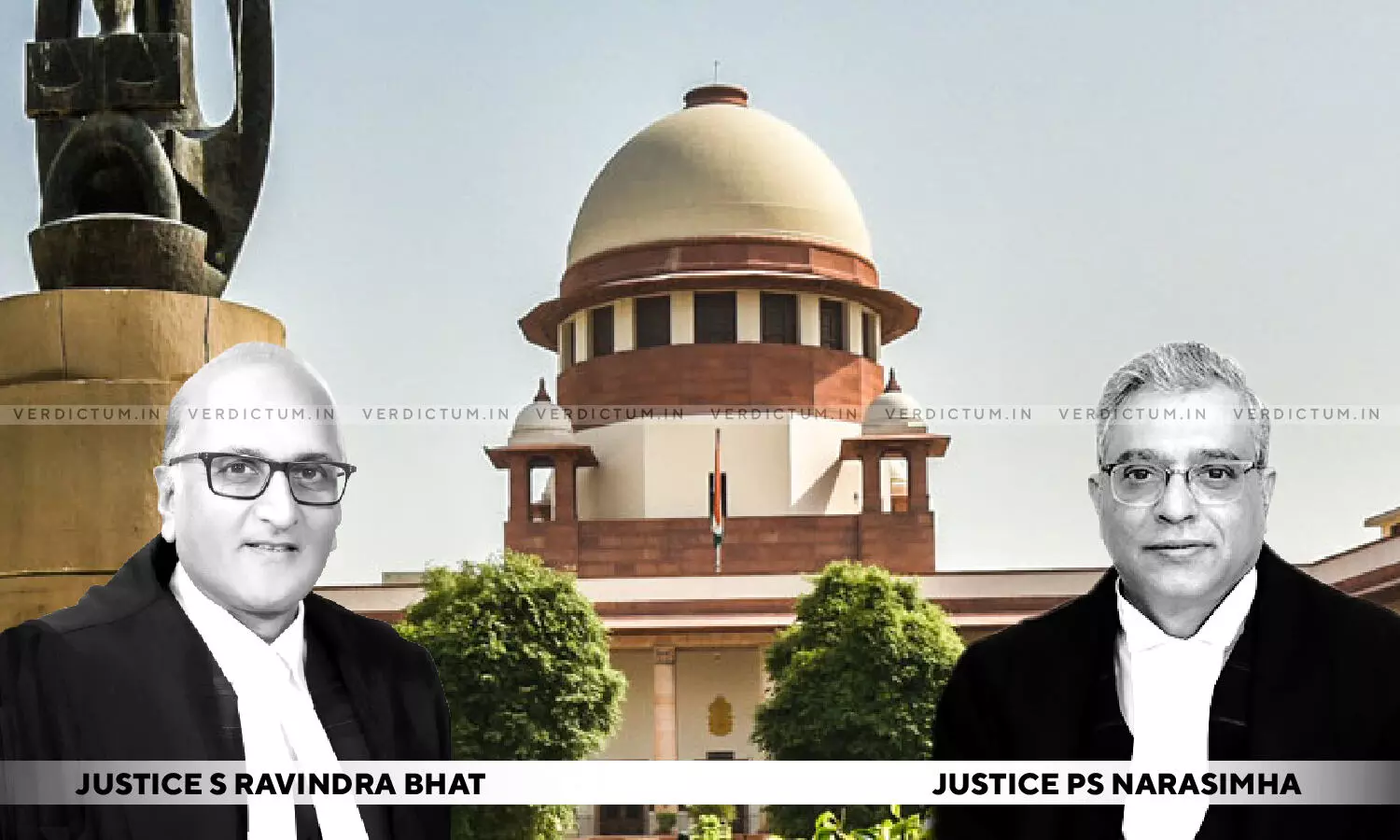
Forcible Dispossession Of Person Of Their Private Property Without Following Due Process Of Law Violative Of Article 300A – SC
 |
|A two-judge Bench of Justice S. Ravindra Bhat and Justice PS Narasimha in a land acquisition case has held that forcible dispossession of person of their private property without following due process of law is violative of both a human right and constitutional right under Article 300A of the Constitution.
Counsel Mr. Mahesh Thakur appeared for the Appellants while Counsel Mr. Abhinav Mukherjee appeared for the Respondent–State before the Apex Court.
An appeal was preferred by original landowners assailing the judgment of the Himachal Pradesh High Court which had disposed of their Writ Petition with liberty to institute a civil suit in accordance with law.
In this case, the Respondent–State had utilized the land of the Appellants and adjoining lands for the construction of the 'Narag Fagla Road' in 1972-73 but allegedly no land acquisition proceedings were initiated, nor compensation was given to the Appellants or the owners of the adjoining land.
Following the judgment of the Himachal Pradesh High Court, land acquisition proceedings were initiated and the award was passed fixing compensation at Rs. 30,000 per bigha. The Reference Court thereafter held that the reference petitioners were entitled to Rs. 39,000 per bigha.
Similarly situated landowners filed Writ Petition before the High Court which led to a direction issued by the Court that lands must be acquired by the Appellants under the Land Acquisition Act with consequential benefits.
Aggrieved, the Appellants approached the High Court by filing a Writ Petition and sought compensation for the subject land or initiation of acquisition proceedings under the Act.
The High Court had held that the matter involved disputed questions of facts and law for determination on the starting point of limitation which could not be adjudicated in Writ proceedings and the writ was disposed of with a liberty file to a civil suit.
The Apex Court noted that the right against deprivation of property unless in accordance with the procedure established by law is a constitutional right under Article 300A.
Further, the Bench also held that it is a cardinal principle of law that nobody can be deprived of liberty without due process or authorization of law.
"When it comes to the subject of private property, this court has upheld the high threshold of legality that must be met, to dispossess an individual of their property, and even more so when done by the State," the Court added.
The Court also held, "Given the important protection extended to an individual vis-a-vis their private property (embodied earlier in Article 31, and now as a constitutional right in Article 300-A), and the high threshold the State must meet while acquiring land, the question remains – can the State, merely on the ground of delay and laches, evade its legal responsibility towards those from whom private property has been expropriated? In these facts and circumstances, we find this conclusion to be unacceptable, and warranting intervention on the grounds of equity and fairness."
The Court noted that the acquisition proceedings initiated in the 1990s occurred only at the behest of judicial intervention i.e., the High Court, and even after such an intervention, the State continued to only extend the benefit of the Court's order to those who had specifically approached it.
In this context, the Bench held –
"The State's lackadaisical conduct is discernible from this action of initiating acquisition proceedings selectively, only in respect to the lands of those writ petitioners who had approached the court in earlier proceedings, and not other land owners, pursuant to the orders dated 23.04.2007 (in CWP No. 1192/2004) and 20.12.2013 (in CWP No. 1356/2010) respectively. In this manner, at every stage, the State sought to shirk its responsibility of acquiring land required for public use in the manner prescribed by law."
The Court held that the facts of the case reveal that the State had in a clandestine and arbitrary manner actively tried to limit disbursal of compensation as required by law only to those who had specifically approached it rather than to all those who were entitled. Thus, the arbitrary action is violative of Appellants prevailing Article 31 right (at the time of cause of action) that warranted consideration and intervention by the High Court.
"Concluding that the forcible dispossession of a person of their private property without following due process of law, was violative22 of both their human right, and constitutional right under Article 300-A, this court allowed the appeal," the Bench observed.
Accordingly, the Court directed the State to treat the subject lands as a deemed acquisition and appropriately disburse compensation to the Appellants and allowed the appeal. The Court further directed the Respondent–State to pay legal costs and expenses of Rs. 50,000/- to the Appellants.
Click here to read/download the Judgment